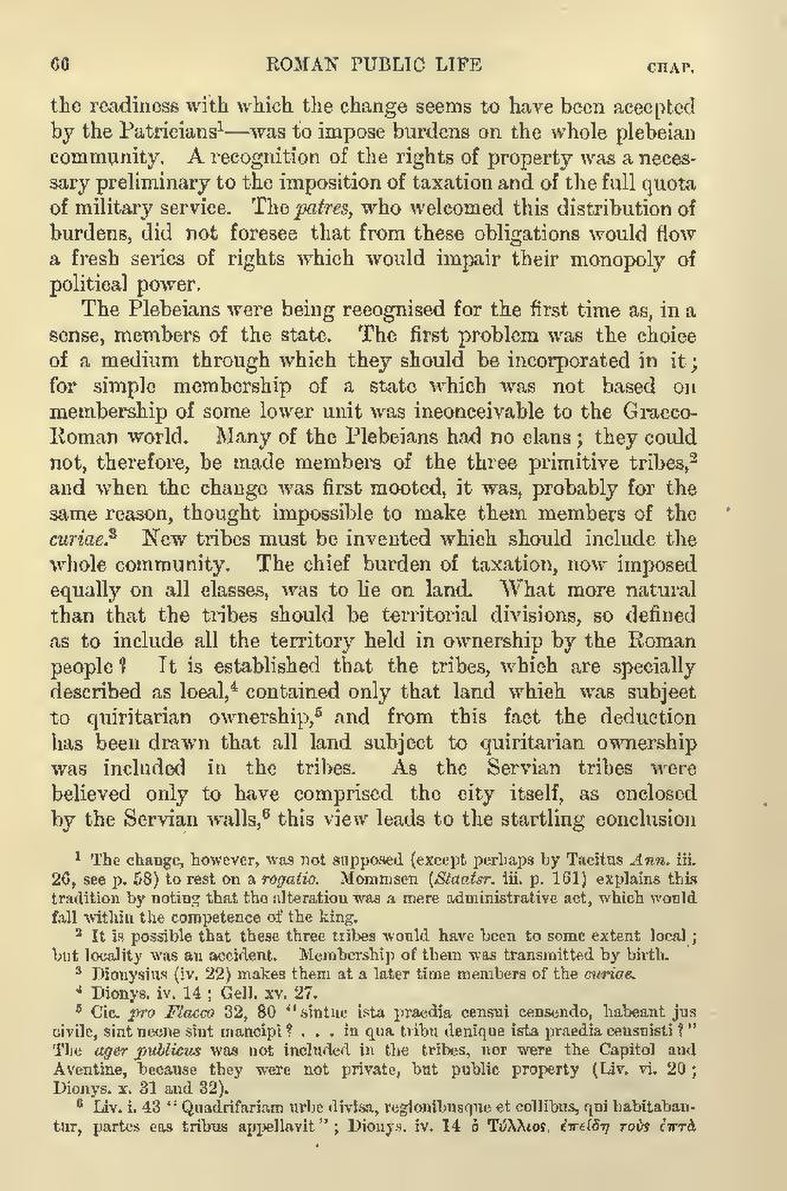the readiness with which the change seems to have been accepted by the Patricians[1]—was to impose burdens on the whole plebeian community. A recognition of the rights of property was a necessary preliminary to the imposition of taxation and of the full quota of military service. The patres, who welcomed this distribution of burdens, did not foresee that from these obligations would flow a fresh series of rights which would impair their monopoly of political power.
The Plebeians were being recognised for the first time as, in a sense, members of the state. The first problem was the choice of a medium through which they should be incorporated in it; for simple membership of a state which was not based on membership of some lower unit was inconceivable to the Graeco-Roman world. Many of the Plebeians had no clans; they could not, therefore, be made members of the three primitive tribes,[2] and when the change was first mooted, it was, probably for the same reason, thought impossible to make them members of the curiae.[3] New tribes must be invented which should include the whole community. The chief burden of taxation, now imposed equally on all classes, was to lie on land. What more natural than that the tribes should be territorial divisions, so defined as to include all the territory held in ownership by the Roman people? It is established that the tribes, which are specially described as local,[4] contained only that land which was subject to quiritarian ownership,[5] and from this fact the deduction has been drawn that all land subject to quiritarian ownership was included in the tribes. As the Servian tribes were believed only to have comprised the city itself, as enclosed by the Servian walls,[6] this view leads to the startling conclusion]*
- ↑ The change, however, was not supposed (except perhaps by Tacitus Ann. iii. 26, see p. 58) to rest on a rogatio. Mommsen (Staatsr. iii. p. 161) explains this tradition by noting that the alteration was a mere administrative act, which would fall within the competence of the king.
- ↑ It is possible that these three tribes would have been to some extent local; but locality was an accident. Membership of them was transmitted by birth.
- ↑ Dionysius (iv. 22) makes them at a later time members of the curiae.
- ↑ Dionys. iv. 14; Gell. xv. 27.
- ↑ Cic. pro Flacco 32, 80 "sintne ista praedia censui censendo, habeant jus civile, sint necne sint mancipi? . . . in qua tribu denique ista praedia censuisti?" The ager publicus was not included in the tribes, nor were the Capitol and Aventine, because they were not private, but public property (Liv. vi. 20; Dionys. x. 31 and 32).
- ↑ Liv. i. 43 "Quadrifariam urbe divisa, regionibusque et collibus, qui habitabantur, partes eas tribus appellavit"; Dionys. iv. 14 [Greek: ho Tullios, epeidê tous hepta
